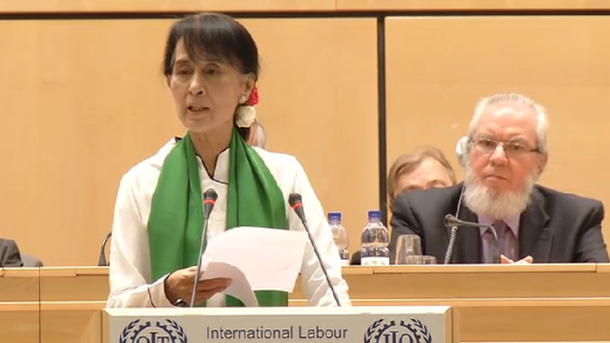Coca Cola will soon be back on the Burmese menu for the first time in 60 years in a further sign of the country’s emergence from deep isolation, but many other potential foreign investors are holding back, confused by conflicting signals or legal issues.
Delays in introducing a new foreign invest law, the absence of an independent judiciary, and calls for caution by opposition leader Aung San Suu Kyi have left Western businesses in particular waiting on the sidelines.
Most significant, perhaps, the decisions by the European Union and the United States to suspend sanctions rather than permanently cancel them have induced some big companies to stay out of Burma, the London Financial Times has found in a survey.
Suu Kyi’s voiced doubts about the value of a new investment law without a reliable legal system were underlined last Thursday when she urged foreign oil companies not to do business with the government-controlled Myanmar Oil and Gas Enterprise (MOGE).
The state agency, which is involved in all oil and gas contracts, “lacks both transparency and accountability,” she told the International Labour Organization (ILO) in Geneva.
“Her comments on the state of [Burma’s] reforms while in Bangkok and calls to energy companies to refrain from cooperation with state-owned MOGE have caused a rift between Suu Kyi and President Thein Sein and exposed their different priorities,” business risk assessors Maplecroft told The Irrawaddy.
“This comes as a reminder that the reform process continues thanks to a fragile balance of power, which has the potential to implode at any time. The reform process remains heavily dependent on two individuals—Suu Kyi and Thein Sein—and on successful cooperation between their support bases,” said Maplecroft’s senior Asia analyst, Giulia Zino.
The denigration of MOGE comes as Burma’s Energy Ministry plans a second oil and gas business promotion conference in Rangoon amid plans to offer more onshore and offshore exploration licenses.
“Western companies are holding back from investing in Myanmar, citing uncertainty over post-sanctions regulations in their home countries,” says the Financial Times. “US executives in particular complain of mixed signals from the Obama administration which, they say, is urging business to invest in Myanmar while warning of penalties should they break disclosure and licensing rules.”
The suspension-only of sanctions was criticized by a Burmese business leader at the ILO conference in Geneva last week.
“Who will come and invest with sanctions suspended only for one year?” said Khine Khine Nwe, secretary of the Basic Employers Organization in the garment industry. “They will wait, so I don’t think there will be much changing if there is still some [sanctions threat] there.”
Burmese employers needed the international community to permanently lift sanctions and to “trust in us,” she said.
The Financial Times said the outbreak of religious and ethnic violence in southwest Arakan State, on top of continued fighting between the Burmese army and an ethnic militia in the north, was adding to the air of uncertainty. The state of emergency declared there, and warnings by President Thein Sein of the violence threatening to hamper reforms, were a “further indication of the fragility of the transition process,” said the global business newspaper.
“US companies talk about vaguely framed warnings from Washington—particularly around business activity that could affect human rights or touch on conflicts in ethnic areas—that have left them unclear about what they can and cannot do,” the paper said.
Maplecroft’s Zino said that a priority for reformists within the Burmese government is to “ensure that economic growth and increased foreign investment follow initial democratic reforms.”
“It is yet unclear whether [Suu Kyi’s] comments will fuel concerns amongst foreign investors that the reform process is not durable, but they will likely contribute to increased scrutiny from domestic and foreign activist groups,” Zino told The Irrawaddy.
In her ILO speech, Suu Kyi called for reform which attracts the kind of investment that is “sustainable and truly beneficial to our people.”
“Investors should adhere to best codes of practices. Track records in regard to internationally accepted labor standards and environmental responsibility should be examined,” she said. “We would like potential investors to think for us and well as for themselves. We understand that investors do not come purely for altruistic reasons. We accept that investments must pay off, investments must lead to profits. But we would like these profits to be shared between the investors and our people.”
However, while Suu Kyi is concerned that business development should not race ahead of public accountability and a properly functioning legal system, some outsiders think changes are happening too slowly.
“Personally, I think what’s most worrying in [Burma] is that its financial sector is extremely slow in development,” the deputy director general of the Japanese Finance Ministry’s International Bureau, Daikichi Monma, told the Kyodo business news agency.
Current Burmese rules prevent foreign banks from establishing full banking services in the country.
“There is high interest in Japanese firms about making forays into [Burma], but I doubt that most can actually make moves,” the deputy general manager of international coordination at Japan’s Mizuho Corporate Bank, Tetsuya Akutsu, said to Kyodo. “It is said that labor costs are cheap in [Burma] and that its people are hardworking, but its social infrastructure is extremely poor.”
Mizuho last week opened a representative office in Rangoon to offer advice to potential Japanese business investors.
But none of these issues are deterring the Coca Cola Company, purveyors of possibly the most ubiquitous brand on Earth. Burma is one of only three countries on the planet which does not stock the fizzy soft drink—the other two being North Korea and Cuba. Not for much longer though: Coca Cola says it will start up business in Burma as soon as it gets a license.

















